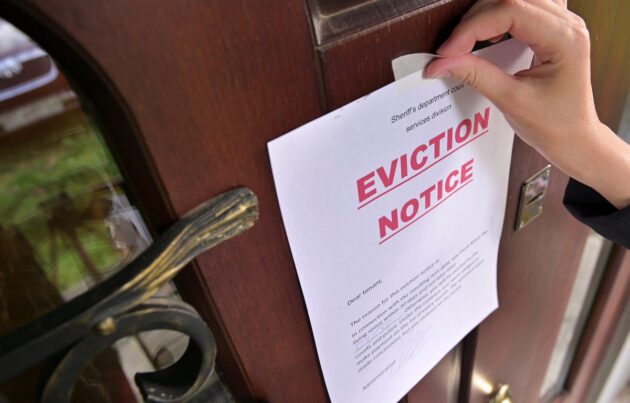How To Find a Rental Immediately That Accepts Prior Evictions and Other Issues
If you have a prior eviction on your record, it's tough to find a new rental. Many landlords will not accept renters with an eviction on their rental history. It's a major red flag for a prospective landlord. And there's a real fear that a tenant with a previous eviction will repeat the bad behavior again.

Evictions can result from a variety of issues, but most often, a past eviction is due to unpaid rent. Of course, a potential landlord's biggest concern, aside from property damage, is losing a month's rent. So, carrying an eviction with you into the rental application process can require you to do a little more work.
While some rentals out there will accept applicants with a prior eviction, bad credit or a variety of other red flags, they're sometimes hard to find. But, don't give up. Your new rental property is out there, even with an eviction. Just get ready to put a little extra effort into the process.
How long will an eviction stay on my public record?
An eviction typically stays on your record for up to seven years. Once this period is over, the eviction comes off your credit report and rental history. You won't have to defend the situation to a potential landlord.
There's also the opportunity to get the eviction expunged early. But this often requires going to court to prove the eviction notice wasn't legal, and you didn't violate any lease agreements. You can also petition the court directly to have the eviction removed.
Taking any of these steps can get your eviction expunged early. But it doesn't necessarily mean you won't have to find a rental while it sits on your record.
Getting started renting with an eviction
In order to find a place to rent while an eviction affects your credit report, there are a few steps you can take as you begin your search. This includes how to look for properties and how to approach property managers.
Start your search early
The earlier you start looking, the more likely you are to find a rental that accepts your eviction. There are more options out there than you'd expect, and chances are one of them will be willing to work with you.
Look in smaller towns or suburbs
Smaller towns and suburbs usually have a lower demand for rentals, which means there are more properties that will accept renting with an eviction. They may still conduct a credit check but might look past it if you can effectively demonstrate you're responsible and capable when it comes to renting.
Search online for rentals that don't require a credit history
There are many websites that let you filter rental properties by those that accept evictions or are no credit check rentals. They may list other items they'll require for you to prove you make rental payments on time, but it will help you overcome your red flags.
Contact property managers
Property management companies and prospective landlords may not promote accepting renters with past evictions, but if you call, you may get another story. It also never hurts to ask if you find a property you really want to live in.
Make sure to have a plan before you begin any of these conversations that include what you'll offer in lieu of a good credit report. Things like referrals, bank statements and a positive rental history (eviction aside) can all help you.
Don't give up
If you don't find a rental that accepts your eviction right away, keep looking. There are rentals out there and you may even find rental programs that can help you with your search.
This advice works for all types of red flags, from evictions to carrying outstanding debt to a history of property damage. You just have to know what evidence you need to bring with you to combat the negatives on your record.

Working with an eviction on your record
You can still rent with an eviction on your record, and there are no-credit-check houses that can make the whole process easier for you. A prospective landlord may decide to work with you as long as you can provide a reasonable explanation for what happened and evidence to support the positive aspects of your rental history. However, it's more difficult to find a rental that accepts evictions if you don't prepare for the process ahead of time.
Be upfront about your eviction
Renting with an eviction is possible as long as you don't try to hide it. When applying for a new rental, the landlord will likely check your credit and rental history, so the eviction will come to light no matter what. Get out in front of it.
It's better to tell the truth from the beginning when talking to a future landlord. It shows a strong character. It also gives you time to present your side of the story first. If you have a reasonable explanation for what happened, the landlord is more likely to forgive your past mistake.
Get a co-signer or roommate to help pay rent
If you have a difficult time finding a rental that accepts your eviction, consider bringing in someone else to improve both your financial situation and rental history. Having a co-signer means you're bringing in a friend or family member who is legally taking on the responsibility of covering your rent if you can't. This is especially helpful if the reason for your previous eviction was due to issues with paying rent, or you currently have poor credit.
A roommate can also help in the same way. Their good credit and/or rental history can boost up your poor credit and eviction, providing a safety net that lets you broaden your search beyond bad credit home rentals.

Prove you're reliable at paying rent
If you have a difficult time finding a rental that accepts your eviction, consider other ways to prove you'll make good on the rental agreement. Collect reference letters from a previous landlord, your boss, co-workers and even family members. If the situation around your eviction wasn't entirely within your control, ask previous landlords involved in the eviction to write a reference that fully explains the situation, as well.
For references from other sources, make sure they establish the high quality of your character. You want to paint a picture that you're a hard worker, one that knows how to pay bills on time. You also want these references to establish you're reliable and financially stable.
To further support these references, make sure to bring in supporting documents like pay stubs from your current job and bank account information.
Work on your credit score
If you have a difficult time finding a rental that accepts your eviction, consider working on your credit score. There are ways to improve it if it's tripping up your rental history review, as well.
A high credit score will show the landlord that you're responsible and likely to pay rent on time.
Pay more rent in advance
To show some stability, consider prepaying more than just the first and last month's rent ahead of time. This removes the uncertainty on the part of your future landlord in relation to whether you'll pay rent on time.
You can also offer to pay a larger security deposit than just a single month's rent. Since security deposits come back to you at the end of your lease, if you don't damage the property, you're not really losing the money, but rather just giving it to your landlord to hold as a good-faith gesture.
Both of these tactics can overcome a credit check with a low score, as well as other issues, like an eviction.
Try to get the eviction removed from your rental history
There are many local organizations that can help you get an eviction removed from your record. However, it's a difficult process and it may take some time. The best strategy is to explore your options.
- Get in touch with the company that filed the eviction. Many times, they'll be willing to remove it from your record if you can provide a reasonable explanation for what happened.
- Contact the credit bureaus. The credit bureaus keep track of evictions and are willing to remove them from your record if you can provide evidence that the eviction happened due to extenuating circumstances.
- Hire a lawyer. If you're struggling to get the eviction simply removed, you may want to consider hiring a lawyer. A lawyer is able to negotiate a settlement with the landlord. They're also a get resource if you're interested in going to court to get your eviction dismissed or appealed.
If you're looking into any of these strategies to make it easier to rent, it's important to remember that they take time. If you need a new place to live right now, it's most likely better to try one of the previous methods for dealing with an eviction on your record, find a rental and then take the time to get it removed from your record for future searches.

How to find rentals that accept evictions
While some rental property listings will advertise they don't do a background check on prospective tenants, others won't. That doesn't mean it's not something a prospective landlord won't consider, though. Especially if you're looking to rent from the actual property owner versus a property manager, you're more likely to negotiate a work-around for bad rental history.
If you can't find enough listings that promote themselves as eviction-friendly, start making calls. Many complexes have a special section for people who have had an eviction in the past, making your bad credit or eviction a smaller barrier than you thought.
You can also:
- Look for apartments that accept Section 8 vouchers. This government program helps low-income families find affordable housing. Many property management companies that accept Section 8 also accept evictions.
- Search for rentals online. There are websites that let you filter results around housing that accepts evictions.
- Contact a housing assistance agency. There are agencies that help people find affordable housing. Some of these agencies even list available homes to rent that accept evictions.
- Look for sublets. If you are unable to find a rental that accepts your eviction, try looking for sublets. This situation doesn't always require a credit report, so your past may not play a role in whether you get the property.
- Try to find a friend or family member who will let you stay with them. Renting a room from a friend or family member is a great interim option while you continue looking for somewhere to rent. It also gives you time to remove your eviction notice from your record.
The key to any of these options is the credit check. You want a rental that isn't going to use your bad rental history and poor credit as the defining factors of whether you'll make a good tenant. Even if they look at this information, you want to feel confident you can provide other evidence as to why you're worth renting to.
Evictions aren't the end
Bad rental history can follow you around for quite a while, making it harder to rent. Especially if you're renting with an eviction, you may hit a lot of dead-ends before finding a place to call home. However, any red flag that may come up isn't a hard 'no' to your ability to rent. By looking for the right rentals and preparing to prove your case in advance, you can address, and even overcome, a past eviction.

